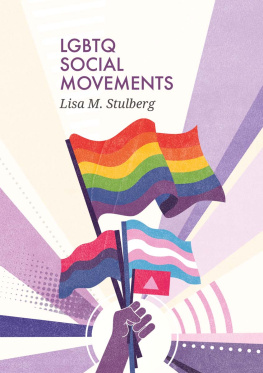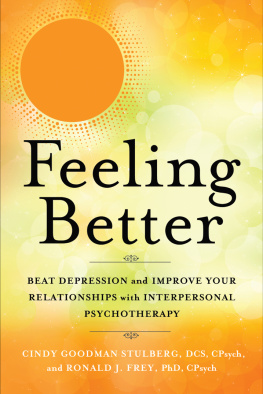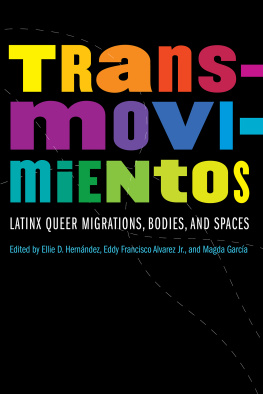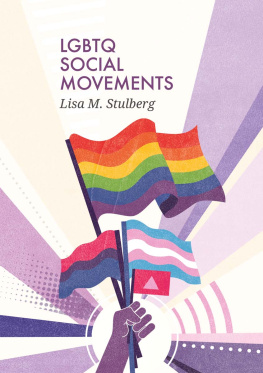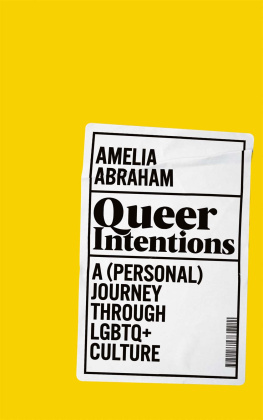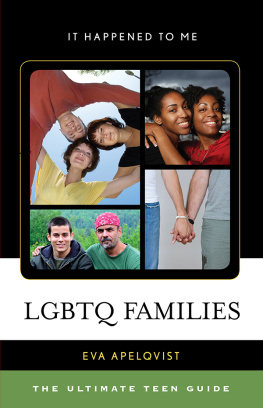Contents
Guide
Pages

Social Movements series
Colin J. Beck, Radicals, Revolutionaries, and Terrorists
Stephanie Luce, Labor Movements: Global Perspectives
Lisa M. Stulberg, LGBTQ Social Movements
David Walls, Community Organizing: Fanning the Flame of Democracy
LGBTQ Social Movements
Lisa M. Stulberg
polity
Copyright Lisa M. Stulberg 2018
The right of Lisa M. Stulberg to be identified as Author of this Work has been asserted in accordance with the UK Copyright, Designs and Patents Act 1988.
First published in 2018 by Polity Press
Polity Press
65 Bridge Street
Cambridge CB2 1UR, UK
Polity Press
101 Station Landing
Suite 300
Medord, MA 02155, USA
All rights reserved. Except for the quotation of short passages for the purpose of criticism and review, no part of this publication may be reproduced, stored in a retrieval system or transmitted, in any form or by any means, electronic, mechanical, photocopying, recording or otherwise, without the prior permission of the publisher.
ISBN-13: 978-1-5095-2740-3
A catalogue record for this book is available from the British Library.
Library of Congress Cataloging-in-Publication Data
Names: Stulberg, Lisa M., author.
Title: LGBTQ social movements / Lisa M. Stulberg.
Description: Malden, MA : Polity Press, [2017] | Series: Social movements | Includes bibliographical references and index.
Identifiers: LCCN 2017023462 (print) | LCCN 2017031945 (ebook) | ISBN 9781509527397 (Mobi) | ISBN 9781509527403 (Epub) | ISBN 9780745656076 (hardback) | ISBN 9780745656083 (pbk.)
Subjects: LCSH: Gay liberation movement--United States | Sexual minorities--United States.
Classification: LCC HQ76.8.U5 (ebook) | LCC HQ76.8.U5 S78 2017 (print) | DDC 306.760973--dc23
LC record available at https://lccn.loc.gov/2017023462
The publisher has used its best endeavors to ensure that the URLs for external websites referred to in this book are correct and active at the time of going to press. However, the publisher has no responsibility for the websites and can make no guarantee that a site will remain live or that the content is or will remain appropriate.
Every effort has been made to trace all copyright holders, but if any have been inadvertently overlooked the publisher will be pleased to include any necessary credits in any subsequent reprint or edition.
For further information on Polity, visit our website: politybooks.com
Acknowledgments
I love that feeling just before I start to read a new book. I take it all in before I even read a word: the cover design, the feel of the paper, the typeface, the Table of Contents. No matter where I am or how quickly I have to digest a book, whether Im reading fiction or nonfiction, for pleasure or for work, I am immediately calmed when I read. Put a book in my hand on a crowded subway and Im good. Everything just melts away, and its just me and the pages. And starting a new book is especially exciting. I just know Im about to start feeling something, or learning something, falling in love with some quirky and flawed character, writing furiously in the margins, staying up way too late reading by the light of my phone.
And it all starts with the Acknowledgments for me. Acknowledgments are the first thing I read when I start any book. I said this once in a class, and I got a much more surprised reaction from my students than I would have expected. It doesnt seem that weird to me, but I guess it is. For me, Acknowledgments are a window into the personality and the relationships of the author. They are usually written in a different voice from the text itself, and I love hearing how the authors voice sounds when theyre not working so hard to be artful or articulate. I feel like Im learning something about the way they rely on people, who they have in their lives, their sense of humor and humility and gratitude.
Anyway, all that is to say that these Acknowledgments sections are very important to me, and I want to make sure I dont forget anyone. I apologize in advance to those I have inevitably left out here.
First, thank you to the amazing staff at Polity. Emma Longstaff initially expressed interest in this book and was my first editor at the press. Her enthusiasm and support were incredibly motivating and appreciated, and I will always be grateful to her. Jonathan Skerrett has been a wonderful editor of the project always so accessible and insightful. My copyeditor, Sarah Dancy, had great attention to detail and the amazing ability to put up with me and all of my anxious notes. Thanks too to Geraldine Beare for compiling the index. The team at Polity including Amy Williams, Adrienn Jelinek, Neil de Cort, and Rachel Moore has been a pleasure to work with. I have to say, I got the most helpful and thorough reviews of the initial manuscript of any Ive ever received on any project. Thanks so much to these three anonymous reviewers for their feedback - the book is immeasurably stronger because of it and to the Polity team for soliciting these wonderful reviews.
Claudia Castaeda, editor extraordinaire, read the entire manuscript draft twice and was exceedingly patient and responsive to all of my questions and concerns. I cant imagine having written this without her feedback and input. Of course, all of the books shortcomings are my own.
This project began because I wanted to write the kind of book that I could use in the kinds of classes I teach at New York University. At NYU, I have had incredible friends, colleagues, and students who have supported me and the book in so many ways over the years. The Department of Applied Statistics, Social Science, and Humanities has been by home at NYU for 15 years, and I am so grateful for it. The NYU Steinhardt PhD students who have been especially supportive of this project include Bryan Rosenberg, Nina Mauceri, Hilary Lustick, Maggie Fay, and Sarah Klevan. Undergrads in my spring 2016 and spring 2017 Social Movements classes read and engaged with earlier drafts of the book in ways that were incredibly helpful to me along the way. Thanks, especially, to Besjana Hoxha, Marcha Johnson, Samantha Padavick, and Jordan Reynolds, for being willing to read and give feedback on draft chapters. The NYU LGBTQ working group - an amazing group of faculty, students, and staff gave me a close read, valuable time, a supportive community, and incisive feedback along the way. Sebastian Cherng provided a crucial cover suggestion at a critical moment. Joe Salvatore has taught me so much over the years and has always been a willing, supportive, and caring listener, colleague, and friend and also great with cover design feedback!
Then there are those friends who just always ask, in exactly the right way, how my writing is going, and they are always there to celebrate accomplishments, to weigh in on small decisions, and to lend encouragement and fun diversion when exhaustion sets in. For this project, those friends and family members especially include Ian Stulberg and Bob Berman, Lauri Hornik, Tony Chen, John and Melissa King, Cori Flam Meltzer and Brad Meltzer, and members of the fam text group who always have grammar advice and cute Bitmojis to share at any time of the day or night. And, while I cannot thank him directly, the late Eric Rofes has frequent conversations with me about this book, even if he doesnt know it. I am regularly inspired by the example he set of how to live life, do politics, write, and teach.
Thanks go, too, to my local coffee shop you know who you are for allowing me to sit there for hours with my wall of books, nursing my extra large decaf iced coffee with extra ice. Thanks, too, to our miniature poodle, Gryffindor (Griffy) for keeping my feet warm while I wrote and for never minding when I needed to take walks or runs with her while my head was in this book. And to the late George Michael, thanks for getting me through a last, intense week of writing the first draft of this book, especially the song Freedom, which I played basically incessantly. I like to think that the lyrics sometimes the clothes do not make the man are not just a commentary about fame but are also, in the context of this project, a comment on the complexities of gender.

